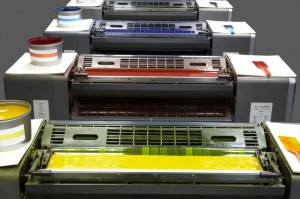Printing Careers Outlook
 The technological developments of the last decade have dramatically transformed the printing industry—so much so that it is now commonly referred to as graphic communications.
The technological developments of the last decade have dramatically transformed the printing industry—so much so that it is now commonly referred to as graphic communications.
The introduction of desktop publishing and other new procedures and equipment has made many jobs stagnant or obsolete, particularly in the prepress area. For example, typesetters, paste-up workers, and film strippers are being replaced by workers who have mastered computerized processes. And Linotype machine operators, photoengravers, and other jobs required for letterpress printing are on the decline. In addition, much of the composition work traditionally done by printing companies now is being handled by customers, who have access to sophisticated design, page layout, and photo manipulation software.
But the recent advances in technology also have created exciting new opportunities. It is projected that by the end of 2009 most printing companies will have converted to complete digital imaging, where printing plates are generated directly from the computer. This process, commonly called direct-to-plate, has been slow to catch on because of its expense and problems presented by its proofing system. As direct-to-plate and other innovative technologies gain ground, the total number of jobs in printing may go down, but people with specialized computer skills will increasingly be needed.
Students graduating from high school and college today are highly computer literate, which puts them in a good position for a career in printing. Most industry experts advise young people to pursue internships and graphic communications programs, but printing is so diversified that almost anyone can find a niche.
“If you’re smart and quick and willing to learn, you can be successful in almost any printing job these days,” says Bob Saluga of Chicago’s Service Web Corporation. Saluga, who has been in printing since the early 1960s, notes that many young people entering the field today—especially in administrative roles—do not have a background in printing. Because of rapidly changing technology and other factors, apprenticeships are being phased out by on-thejob training. With solid computer knowledge and strong initiative, entry-level workers can go a long way.
The U.S. Department of Labor predicts that employment in the printing industry will decline by 10 percent from 2004–14. This decline reflects competition from nonprint media, such as the Internet; industry consolidation; and increasing use of nontraditional printing technologies. More companies are doing at least a part of prepress in-house. Employment of desktop publishing specialists is expected to increase faster than average both in printing companies and in publishing and advertising firms. Demand for manual paste-up workers, photoengravers, camera operators, film strippers, and platemakers is expected to decline, as will the number of typesetting and composing machine operators. Employment of offset press operators and letterpress operators should decrease rapidly. Employment of bookbinders and bindery workers will decline in response to the growth of electronic printing.
Although many experts predict that we will one day become a paperless society, this reality is still a long way off. There will continue to be a demand for printing in education, business, and other sectors. It has been said that the volume of printed information doubles every five years. This bodes well for newcomers to the field.
Related Career Fields:
Related Career Cluster:
Related Careers:
- Art Directors
- Bindery Workers
- Book Editors
- Cartographers
- Cartoonists and Animators
- Computer Programmers
- Cost Estimators
- Desktop Publishing Specialists
- Electronics Engineering Technicians
- Electroplating Workers
- General Maintenance Mechanics
- Graphic Designers
- Indexers
- Industrial Engineers
- Industrial Machinery Mechanics
- Layout Workers
- Lexicographers
- Magazine Editors
- Paper Processing Workers
- Photographers
- Photographic Equipment Technicians
- Photographic Laboratory Workers
- Prepress Workers
- Printing Press Operators and Assistants
- Quality Control Engineers and Technicians
- Typists and Word Processors
